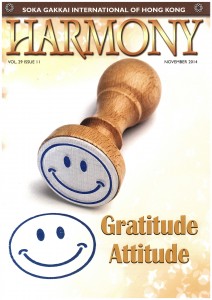HARMONY-November 2014
Thu, 6th Nov 2014
Category: Harmony, News (All), Publication
Cultivating and maintaining an attitude of gratitude is a lifelong process. It appears that our brains are programmed to have much deeper memory and faster recollection for negative experiences than happy ones. Scientific research shows this again and again as a basic and wide-ranging principle of psychology. It is perhaps meant as an evolutionary protective mechanism to remind and stop us from repeating some situations.
Other research shows that happy people are those who have the ability to set aside negative experiences and recall more of their positive experiences. So what marks the difference between a happy and an unhappy person is not the amount of either positive or negative situations they experience, but the way they focus their attention on the positive rather than the negative.
In Buddhism we do not judge events as either positive or negative; we look at situations from the perspective of the Ten Worlds, and depending in which life-state we dwell, we regard our circumstances accordingly. Our life-state is ever changing and without a solid Buddhist practice, we can easily be swayed from a state of perfect bliss and happiness into a deep and dark depression triggered by our thoughts and circumstances.
So how do we get out of the negativity loop and develop this “Attitude of Gratitude”? President Ikeda says: “Viewing events and situations in a positive light is important. The strength, wisdom and cheerfulness that accompany such an attitude lead to happiness. To regard everything in a positive light or with a spirit of goodwill, however, does not mean being foolishly gullible and allowing people to take advantage of our good nature. It means having the wisdom and perception to move things in a positive direction by seeing things in their best light while all the time keeping our eyes firmly focused on reality.”
We need wisdom and a strong Buddhist practice fueled with both study and abundant chanting of Nam-myoho-renge-kyo to lift our life condition to the point where we truly appreciate everything about ourselves and around us. When we see the world with the Buddha’s eyes, we cannot help but be filled with absolute gratitude for our life and the great mission we have.
Carola Chard
Quotes of the Month:
“What can we say, then, of persons who are devoting themselves to Buddhism? Surely they should not forget the debts of gratitude they owe to their parents, their teachers, and their country. But if one intends to repay these great debts of gratitude, one can hope to do so only if one learns and masters Buddhism, becoming a person of wisdom.”
(WND1 On Repaying Debts of Gratitude p.690)

